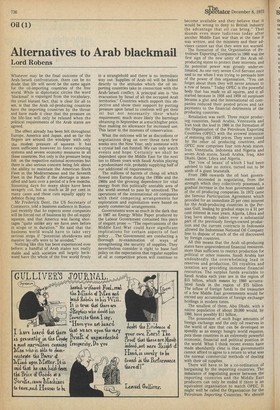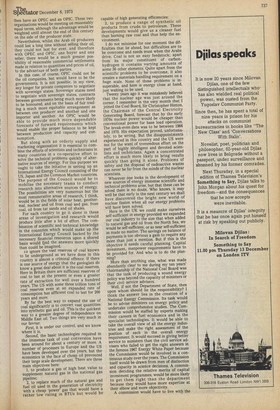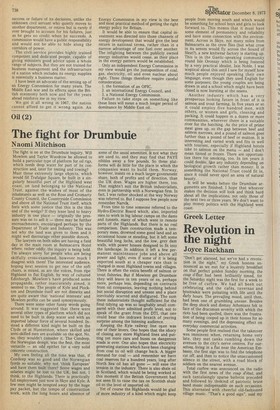Alternatives to Arab blackmail
Lord Robens
Whatever may be the final outcome of the Arab/Israeli confrontation, there can be no doubt that life will never be the same again for the oil-importing countries of the free world. While in diplomatic circles the word 'blackmail' is expunged from the vocabulary, the cruel blatant fact, that is clear for all to see, is that the Arab oil-producing countries have the importing countries by the throat and have made it clear that the pressure on the life-line will only be relaxed when the political requirements of the Arab states are agreed.
The effect already has been felt throughout Europe, America and Japan, and so far the fingers are around the windpipe with only the modest pressure of squeeze. It has been sufficient however to force rationing systems and severe economy measures in all these countries. Not only is the pressure being felt on the respective national economies but there is also serious concern being felt about the ability to maintain the American. Sixth Fleet in the Mediterranean and the Seventh Fleet in the Pacific if the shortage is intensified and lasts over a period of a few months. Steaming days for many ships have been savagely cut, but as much as 20 per cent in many cases and these cuts equally apply to defence flying time.
Mr Frederick Dent, the US Secretary of Commerce, told a business audience in Boston just recently that he expects some companies will be forced out of business by the oil supply squeeze, and that America was facing shortages "quite unlike any we have seen before in scope or in duration." He said that the business world would have to take very serious steps if "potential shutdowns and massive lay-offs were to be avoided."
Nothing like this has been experienced ever before; a handful of Arab states not really stable and with societies still largely backward have the whole of the free world firmly in a stranglehold and there is no immediate way out. Supplies of Arab oil will be linked directly to the attitudes which the oil importing countries take in connection with the Arab/Israeli conflict. A principal aim is "the evacuation by Israel of all the occupied Arab territories." Countries which support this objective and show their support by putting pressure upon Israel to conform will get their oil but not necessarily their whole requirement; much more likely the barrelage obtaining in September at a muchhigher price, thus making no allowance for increased use. This latter in ,the interests of conservation.
What the outcome will be as discusgions or negotiations drag on over these next few weeks into the New Year, only someone with a crystal ball can foretell. We can only watch events and hope. Certainly we shall be dependent upon the Middle East for the next ten to fifteen years with Saudi Arabia playing a predominant role, probably supplying half of our additional oil requirements.
The millions of barrels of cheap oil which flowed into Europe during the 1950s and the 1960s and the growing dependence for vital energy from this politically unstable area of the world seemed to pass by unnoticed. The operations of the international oil companies with their competing arrangements for exploration and exploitation were based on purely commercial arrangements.
Governments were so much in the dark that in 1967 an Energy White Paper produced by the Labour Government contained this piece of elegant prose — "The repercussions of the Middle East War could have significant implications for certain aspects of fuel policy. ... The Government are conducting a thorough re-examination of ways of strengthening the security of supplies. They nevertheless consider it right to base fuel policy on the expectation that regular supplies of oil at competitive prices will continue to become available and they believe that it would be wrong to deny to British industry the advantage that oil can bring." That gounds even more ludicrous today after another Middle East war than at the time it was written, and the ministers and their advisers cannot say that they were not warned. The formation of the Organisation of Pe troleum Exporting Companies in 1960 was the first sign of the new unity of the Arab oil producing states to protect their interests, and its potential power was grossly under-estimated. As one very senior Civil Servant once said to me when I was trying to persuade him of the power of this organisation, "You can forget about them they will never amount to a row of beans." Today OPEC is the powerful body that has made us all squirm, and it all started because in 1958 and 1959 oil surpluses became a glut and the international oil companies reduced their posted prices and tax payments to the financial detriments of the producing countries.
Retaliation was swift. Three major producing countries, Saudi Arabia, Venezuela and Iran took the lead in 1960 in the formation of the Organisation of the Petroleum Exporting Countries (OPEC) with the avowed intention of restoring the 1958 prices. They were joined by the other oil producing countries, and OPEC now comprises four non-Arab states, Iran, Venezuela, Indonesia and Nigeria and seven Arab states, Saudi Arabia, Iraq, Abu Dhabi, Qater, Libya and Algeria.
The 'row of beans' of which I had been advised to take no notice, turned out to be seeds of a giant beanstalk.
From 1960 onwards the oil host governments succeeded in negotiating, from the strength which they collectively possessed, a gradual increase in the host government take of the oil producing companies. 'In 1972 came the famous Participation Agreement which provided for an immediate 25 per cent interest for the Arab-producing countries in the Per sian Gulf, leading by gradual steps to a 51 per cent interest in nine years. Algeria, Libya and Iraq have already taken over a substantial part of the previously foreign-owned production and the current contracts in Indonesia allowed the Indonesian National Oil Company free to dispose of much of the oil discovered by foreign countries.
All this means that the Arab oil-producing states have unprecedented financial resources, more than sufficient to restrict production for political or other reasons. Saudi Arabia has undoubtedly the overwhelming lead in reserves and production. Oil royalties and taxation are providing immense financial resources. The surplus funds available to Saudi Arabia each year are in the region of $15 billion, which means by 1980 accumulated funds in the region of $75 billion.
The inflow of foreign funds to the treasuries of a few Middle East governments would far exceed any accumulation of foreign exchange holdings in modern times.
The smallest of them, Abu Dhabi, with a native population of about 20,000 would, by 1980, have possibly $11 billion.
The possession of such huge amounts of foreign exchange and the only oil reserves in the world of size that can be developed as speedily as an energy hungry world requires, puts these countries in an extremely powerful economic, financial and political position in the world. What I think recent events have made abundantly clear is that governments cannot afford to agree to a return to what was the normal commercial methods of dealing with their oil supplies. There will have to be a co-ordination of bargaining by the importing countries. The imbalance of negotiating power between the importing countries and the Middle East producers can only be ended if there is an
equivalent organisation to match OPEC. It might well be called the Organisation for the Petroleum Importing Countries. We should
then have an OPEC and an OPIC. These two organisations would be meeting on reasonably equal terms, although the advantage would be weighted until almost the end of this century on the side of the producer state.
Nevertheless, whilst the Arab oil producers could last a long time without selling their oil, they could not last for ever, and therefore with OPEC and OPIC, one buyer and one seller, there would be a much greater possibility of reasonable commercial settlements made in relation to quantities and prices of oil, to the advantage of both parties.
In this case, of course, OPIC could not be the oil companies, but would have to be the governments. It is not possible, in my view, any longer for private companies to negotiate with sovereign states. Sovereign states need to negotiate with sovereign states, contracts between governments being much more likely to be honoured, and on the basis of fair trading a much more equitable arrangement as between one producer and another and one importer and another. An OPIC 'would be able to provide much more dependable forecasts of forward requirements which would enable the proper balance to be kept between production and capacity and consumption.
But along with an orderly supply and marketing organisation it is essential to combine the efforts of scientists and technicians in many countries in a co-operative effort to solve the technical problems quickly of alternative sources of energy. For this purpose we ought to take the initative in setting up an International Energy Council consisting of the US, Japan and the Common Market countries. The purpose of the Council would be to mobilise the necessary teams to conduct research into alternative sources of energy. The possibilities are very numerous but the most remunerative areas of research, I think, would be in the fields of solar heat, geothermal, nuclear and oil from coal and gas, from coal, oil from tar sands and oil shales.
For each country to go it alone in these areas of investigation and research would produce little after a lot of effort. The combination of scientific and technical knowledge in the countries which would make up the International Energy Council backed by the necessary financial resources upon a shared basis would fjnd the answers more quickly than could be imagined.
o ignore the vast reserves of coal known to lie underground as we have done in this country is almost a criminal offence. If there is one source of energy that the geologists do know a great deal about it is the coal reserves. Here in Britain there are sufficient reserves of coal to last at the present or even a greater rate of extraction for well over a hundred years. The US with some three trillion tons of coal reserves even at an expanded rate of consumption has sifficient coal to last for 200 years and more.
By far the best way to expand the use of coal significantly is to convert vast quantities into synthetic gas and oil. This is the quickest way to a greater degree of independence on Middle East oil. Two things are very much in our favour.
First, it is under our control, and we know where it is.
Second, the basic technologies required in the immense task of coal conversion have been around for about a century or more. A number of processes in Europe and the US have been developed over the years, but the economics in the face of cheap oil prevented their large scale development. There are three main objectives here:
1, to produce a gas of high heat value to supplement natural gas in the national gas pipeline;
2, to replace much of the natural gas and fuel oil used in the generation of electricity with a cheap 'power' gas that would have a rather low rating. in BTUs but would be
capable of high generating efficiencies: 3, to produce a range of synthetic oil products from crude to petroleum. These developments would give us a cleaner fuel than burning raw coal and thus help the environment.
I do not minimise for one moment the difficulties that lie ahead, but difficulties are to be overcome and needs must when the Arabs drive. Coal is not an easy feedstock; apart from its major constituent of carbonhydrogen it contains varying amounts of some 36 other elements.' Quite apart from the scientific problems to be overcome, it also creates a materials handling requirement on a huge scale. None of these problems is insuperable, and here is energy close at hand, just waiting to be used.
Twenty years ago it was mistakenly believed that the nuclear age was just around the corner. I remember in the very month that I joined the Coal Board, Sir Christopher Hinton, the Chairman of the Central Electricity Generating Board, forecast that by the early 1970s nuclear power would be cheaper than conventional power for base load operation. The break-even date was to be between 1966 and 1970. His expectation proved, unfortunately, to be wrong. But the disappointments experienced in this country and the US were not for the want of tremendous effort on the part of highly intelligent and devoted scientists and technicians. Again a concentrated effort is much more likely to bring results quickly than going it alone. Problems of safety and the disposal of radioactive wastes can never be far from the minds of the nuclear scientists.
Wherever one looks in the development of new sources of energy immense scientific and technical problems arise, but that these can be solved there is no doubt. Who knows, it may well be that early in the next century we shall have discovered the bright new world of nuclear fission when all our energy problems will have been solved.
Here in the UK we could make ourselves self-sufficient in energy provided we expanded our coal industry to the size that when added to natural gas and oil from the North Sea, we would be self-sufficient, or as near self-sufficient as made no matter. The savings on balance of payments is too obvious a gain to require any more than just a mention. But if this is the objective it needs careful planning. Capital investment, manpower requirements have to be provided for. And who is to do the planning? More than anything else, what was made abundantly clear to me during my ten years' hairmanship of the National Coal Board was that the task of producing a sound energy policy was beyond the capacity of ministers or their civil service advisers.
Well, if not the Department of State, then upon whom should lie the responsibility? I think the answer lies in the creation of a National Energy Commission. Its task would be to advise ministers on energy policy and undertake comprehensive studies. The Commission would be staffed by experts making their careers in fuel economics and in the specialist technologies. It would be able to take the overall view of all the energy industries and make the right assessment of the position of each in the overall energy requirement. It would succeed in giving better service to ministers than the civil service advisers who failed to get the right answers in the famous 1967 Energy White Paper because the Commission would be involved in a continuous study over the years. The Commission itself would be drawn from men of distinction and capacity in science decisions. A commis sion deciding the relative merits of capital investment programmes, would be more likely to get them right than the department because they would have more expertise at their elbow and more objectivity.
A commission would have to live with the
success or failure of its decisions, unlike the unknown civil servant who quietly moves to another department, or retires but is rarely if ever brought to account for his failures, just as he gets no credit when he succeeds. A commission would have a public responsibility and would not be able to hide along the corridors of power.
The civil service provides highly trained competent and dedicated people, capable of giving ministers good advice upon a whole range of subjects. But they are not trained for business management and the infrastructure of a nation which includes its energy supplies is essentially a business matter.
I have been an advocate of the setting up of an Energy Commission for many years. The Middle East war and its effects upon the British eceonomy both now and for the years ahead reinforce me in my view.
We got it all wrong in 1967, the nation cannot afford to get it wrong again. An Energy Commission in my view is the best and most practical method of getting the right energy policy for Britain.
It would be able to ensure that capital investment was directed into those channels of energy development that would give the best return in national terms, rather than in a narrow advantage of one fuel over another. The infighting between the publicly owned energy industries would cease, as their place in the energy pattern would be established.
Only an independent Energy Commission in my view would get the juxtaposition of coal, gas, electricity, oil and even nuclear about right. Three things therefore require careful consideration: 1. the formation of an OPIC, 2. an international Energy Council, and 3. a National Energy Commission.
Failure to take steps on something like these lines will mean a much longer period of dominance by Middle East oil.












































 Previous page
Previous page